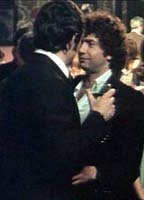
The Bisto Kids
by Justacat
~ A Bodie/Doyle Manifesto ~
The first time I ever saw an episode of The Professionals, I had no idea who the characters were, had never read a story, and the sum total of my knowledge of the show was that it was "the British Starsky & Hutch." I was baffled. Which one was Bodie? Which one was Doyle? And oh, those clothes, those haircuts.… My poor eyes!
Insidiously, without my even realizing it, the show and the characters worked their way deep under my skin, and within six months I was so obsessed with this fandom, with the B/D pairing, that I was spending hundreds of hours overhauling and entirely reworking the online Pros archive (not to mention begging shamelessly and pretty incessantly for anyone to talk with me about the show!). And in doing the overhaul, time and time again I came upon fans who, though they might have moved on, though Pros may no longer have been their immediate passion, still retained a deep, abiding love for Bodie and Doyle, a lasting devotion to the show and the fandom.
What is it about Pros that inspires this kind of loyalty, this kind of obsession? Why has its appeal proved so enduring, even in the U.S., where the show was (with a few minor exceptions) never even broadcast and fans have had to deal with PAL video format and umpteenth-generation tapes and now DVD region coding just to see an episode? How is it that in this day and age of flashy fandoms and special effects, Popslash and Buffy and Firefly and huge online archives, new fans continue to be attracted to the arguably somewhat outdated world of CI5?
Well, there's a reason for this fandom's longevity, as it happens, and that reason can be summed up in two words: Bodie and Doyle. We all know that Kirk/Spock was the first slash pairing, the subtext that launched a thousand ships, the father (mother?) of them all - but The Professionals was arguably the first slash fandom, the first begun as a slash fandom and for many years exclusively slash, without either a general fandom like Star Trek's or a sizeable relationship-driven but still "gen" fandom like Starsky and Hutch's. The Pros fandom was always essentially the Bodie/Doyle fandom.
To distill the appeal of the show and the pairing, not to mention two decades of fandom, into 5,000 words (well, give or take a few thousand!) feels like an impossible task. In drafting this, the more I wrote the more I realized: there simply is no way. The best I could hope to do would be to introduce newbies to, and remind longer-term fans of, a few of the incidents and episodes and moments in which the pairing is grounded, and to touch glancingly upon some of the major elements that, to my mind, make this pairing work so well, make it move me, touch me, more deeply and in more ways than any other pairing ever has.
Anyone whose days in fandom predate the internet is probably at least somewhat familiar with Pros. But despite its enduring popularity it is not the "fandom of the moment," and many newer fans might be in the same position of ignorance I was only a few short years ago. So first order of business: a brief background.
The Professionals was a British TV series broadcast between 1977 and 1983, for a total of 57 episodes, that catalogued the exploits of Ray Doyle (Martin Shaw) and William Andrew Philip Bodie (Lewis Collins), partner agents in CI5, and their boss, George Cowley (Gordon Jackson). (And for the newbies who are still working out who is who, I'll pass on the mnemonic that was given to me: it's Bodie with the body (or at least more body!), and Doyle with the coils (of hair, that is).)
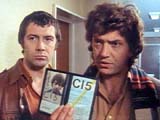
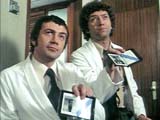 Understanding Bodie and Doyle starts with CI5, "Criminal Intelligence 5," a body of about forty men (and a few women) drawn from the cream of all the other services - commandos, SAS, marines, paras, police, and perhaps even some representatives from the other side of the line, the criminal side - to form an elite squad whose mission was to fight crime and terrorism in Britain. Its brief, in Cowley's immortal words: "to keep England smelling, if ever so faintly, of roses and lavender," to "see that no one messes on our doorstep." How? By employing sophisticated methods of criminal intelligence to prevent and defuse threats before they manifested themselves - and if that failed, to use any means necessary, including ones that were less-than-sweet-smelling themselves, to save innocents from violence. CI5's mandate: take on the most vile and violent of the criminals, and do not hesitate to use their own methods against them when other means are inadequate; fight violence with violence, in order to save innocents from violence.
Understanding Bodie and Doyle starts with CI5, "Criminal Intelligence 5," a body of about forty men (and a few women) drawn from the cream of all the other services - commandos, SAS, marines, paras, police, and perhaps even some representatives from the other side of the line, the criminal side - to form an elite squad whose mission was to fight crime and terrorism in Britain. Its brief, in Cowley's immortal words: "to keep England smelling, if ever so faintly, of roses and lavender," to "see that no one messes on our doorstep." How? By employing sophisticated methods of criminal intelligence to prevent and defuse threats before they manifested themselves - and if that failed, to use any means necessary, including ones that were less-than-sweet-smelling themselves, to save innocents from violence. CI5's mandate: take on the most vile and violent of the criminals, and do not hesitate to use their own methods against them when other means are inadequate; fight violence with violence, in order to save innocents from violence.
Ray Doyle and William Andrew Phillip Bodie (who is referred to exclusively as Bodie; in only one episode, The Rack, are his other names mentioned) were a team - the top team - in this organization. When the show starts, both have been in CI5 for at least a few years; the circumstances of their joining, and their teaming, remain shrouded in mystery (and the subject of many a fanfic). The show gives only the barest, most tantalizing hints, scattered throughout the episodes, of their pre-CI5 lives - but it's enough to conclude that they came to CI5 from very, very different backgrounds.
COWLEY: You've never told me about Bodie. I made you a team, what, two years ago?
DOYLE: Two years and three months.
COWLEY: That's long enough.
DOYLE: Long enough for what?
COWLEY: For him to get up your nose, irritate you.
DOYLE: [smiling] Oh, he does that, all right. Every day, he does that.
COWLEY: Chalk and cheese, eh?
DOYLE: Yeah.
COWLEY: Ah, it's worked well, though.
DOYLE: Yeah, I've watched his back, he's watched mine. We're both still alive. At least, this morning we were both still alive.
-From "Close Quarters"
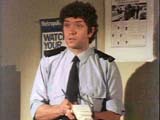
Doyle came to CI5 from the Met - the Metropolitan, the London branch of the British police force; he was a copper, a Detective Constable who worked some of the toughest beats in London and spent time in the Drugs Squad. Before that he spent at least some of his youth in Derby, and he was a wild kid, a "right tearaway"; he also at some point took art classes, and he lived off a rich woman for at least a little while (or at least so he tells Bodie!).
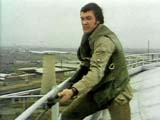 Bodie had a very different - and very colorful - background. Whereas Doyle devoted the early years of his career to upholding order and justice in society, believing in and enforcing the rule of law, suppressing violence and (presumably) not carrying a weapon, Bodie was always a soldier, a man of war. We know nothing about his family, but we know he left school at 14 and eventually joined the merchant navy, he jumped ship at Dakar (Senegal) after three years and thereafter was a bouncer in an African club, did some gun-running for both sides during the Congo War, and was a mercenary soldier in Angola and Biafra. After some "dubious" activities in Jordan, he returned to England to join the army and became a sergeant with the Paratroopers, during which time he saw action in Belfast; eventually he was seconded to the Special Air Services, and from there he joined CI5.
Bodie had a very different - and very colorful - background. Whereas Doyle devoted the early years of his career to upholding order and justice in society, believing in and enforcing the rule of law, suppressing violence and (presumably) not carrying a weapon, Bodie was always a soldier, a man of war. We know nothing about his family, but we know he left school at 14 and eventually joined the merchant navy, he jumped ship at Dakar (Senegal) after three years and thereafter was a bouncer in an African club, did some gun-running for both sides during the Congo War, and was a mercenary soldier in Angola and Biafra. After some "dubious" activities in Jordan, he returned to England to join the army and became a sergeant with the Paratroopers, during which time he saw action in Belfast; eventually he was seconded to the Special Air Services, and from there he joined CI5.
"That's the main thing, staying cool. Saw my medical report--slow heartbeat, slow metabolism. Gotta be cool. Sneaked a look at yours, though. Very uncool. Hot temperament. Still, a good man. The tops. Worth knowing. You won't fall if they push."
-Bodie to Doyle in "Discovered in a Graveyard"
Bodie's the cool one of the partnership - at least at first blush. He's hard, capable of being very cold, very violent; he's extremely familiar and comfortable with weaponry and the trappings of war, with the rifles and tanks and machinery - and with the killing. Doyle, by contrast, is the "hot" one, emotional, moody, mercurial, quick to anger, quick to forgive. He's a bit sensitive, a bit arty, and though he's an ace with a handgun, he's perhaps a bit of a bleeding heart - Bodie says of him in Discovered in a Graveyard that he'd "feel guilty over the invention of gunpowder."
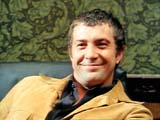 Or at least, those are their superficial personae, the way the contrast between them is set up. In reality, neither is so easily categorized, both are complex and multidimensional - perhaps surprisingly so, given the era and the fact that this was a popular TV show with a tough-guy slant. Bodie can be utterly ruthless, a killing machine - yet he quotes poetry at the drop of a hat. He can be grim and hard and threatening, give off a tangible aura of brooding menace - but he also acts like a big overgrown kid at times, laughing at his own jokes, taking gleeful pleasure in his "toys" (like the battering ram contraption constructed for him in First Night). He's stoic and seemingly impenetrable - yet he's also capable of pitching the finest of hysterical hissy-fits. He's charming, he's handsome, he's egotistical, he smirks and preens and hams it up; he's dangerous and mean and unforgiving and deadly competent - all in one very fine-looking package, complete with endless lashes sweeping to cover devastatingly deep-blue eyes.
Or at least, those are their superficial personae, the way the contrast between them is set up. In reality, neither is so easily categorized, both are complex and multidimensional - perhaps surprisingly so, given the era and the fact that this was a popular TV show with a tough-guy slant. Bodie can be utterly ruthless, a killing machine - yet he quotes poetry at the drop of a hat. He can be grim and hard and threatening, give off a tangible aura of brooding menace - but he also acts like a big overgrown kid at times, laughing at his own jokes, taking gleeful pleasure in his "toys" (like the battering ram contraption constructed for him in First Night). He's stoic and seemingly impenetrable - yet he's also capable of pitching the finest of hysterical hissy-fits. He's charming, he's handsome, he's egotistical, he smirks and preens and hams it up; he's dangerous and mean and unforgiving and deadly competent - all in one very fine-looking package, complete with endless lashes sweeping to cover devastatingly deep-blue eyes.
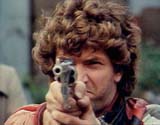 Doyle, meanwhile, is "sensitive" at times. He sheds tears when Bodie is stabbed in Klansmen and when his first Met partner is killed in When the Heat Cools Off. He can even be a bit sanctimonious - "nobody's nobody," he lectures the CI5 forensic man in Killer With a Long Arm when the man tells him in response to his question that the dead guy was "nobody" - "he did have a wife and kids, you know!" He seems at times to be troubled by violence and killing - yet violence often seems to be simmering under his surface, and there are times when he seems veritably to exult in being as violent and wild as he can. He's tough and whippy and hard as nails, takes great enjoyment in his own physical abilities and shows no hesitation about using them; he's a scrappy fighter and has the capacity to be as vicious as they come. He can be volatile and temperamental, but he's often quite notably self-contained, and he doesn't flat-out laugh all that much or even smile (except at Bodie), though he has a definite streak of playfulness and a sharp, if low-key, sense of humor. Oh, and a skinny, muscley, sexy body that he adorns with jewelry - a neck chain, a bracelet - and shows off at the slightest provocation, leaving his shirts artfully unbuttoned and posing shamelessly against walls and doorways.
Doyle, meanwhile, is "sensitive" at times. He sheds tears when Bodie is stabbed in Klansmen and when his first Met partner is killed in When the Heat Cools Off. He can even be a bit sanctimonious - "nobody's nobody," he lectures the CI5 forensic man in Killer With a Long Arm when the man tells him in response to his question that the dead guy was "nobody" - "he did have a wife and kids, you know!" He seems at times to be troubled by violence and killing - yet violence often seems to be simmering under his surface, and there are times when he seems veritably to exult in being as violent and wild as he can. He's tough and whippy and hard as nails, takes great enjoyment in his own physical abilities and shows no hesitation about using them; he's a scrappy fighter and has the capacity to be as vicious as they come. He can be volatile and temperamental, but he's often quite notably self-contained, and he doesn't flat-out laugh all that much or even smile (except at Bodie), though he has a definite streak of playfulness and a sharp, if low-key, sense of humor. Oh, and a skinny, muscley, sexy body that he adorns with jewelry - a neck chain, a bracelet - and shows off at the slightest provocation, leaving his shirts artfully unbuttoned and posing shamelessly against walls and doorways.
In short, Bodie and Doyle, like "real" people, are layered and complex and not really susceptible to easy categorization. And this is part of what makes them so endlessly appealing.
COWLEY: Bodie. Doyle. Hold on a moment. World Chemical Products. Man just fell out of a seventh-storey window.
DOYLE: That's police business.
COWLEY: He jumped.
BODIE: That's his business.
COWLEY: Somebody had slipped him a drug. Him and half the staff there.
DOYLE and BODIE: That's drug squad business.
COWLEY: What are you two, some kind of music-hall act?
-From "Private Madness, Public Danger"
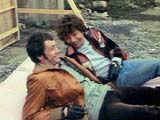
If Bodie and Doyle are appealing apart, they're irresistible together. Pros is a "partner" show of the highest order: the partnership is almost always in the foreground, and Bodie and Doyle are a team in every sense of the word. Ultimately, it is the way they act when they're together - especially when contrasted with the way they act when they're apart - that makes the pairing work so brilliantly and seem so inevitable.
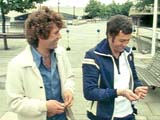 The obviousness of their relationship is less the product of overt declarations or large emotional scenes than it is the cumulative effect of innumerable small but noteworthy incidents - glances, exchanges, moments, that taken together lead to one inevitable conclusion and defy alternative explanation. It's understated (if not precisely subtle) - yet there is hardly an episode that does not include some indication of their deep commitment to each other. Even Involvement, the episode in which Doyle falls in love with a woman and talks of marriage, ends with the two of them together, Bodie offering comfort and Doyle, eventually, accepting it, putting his arm around Bodie's shoulder as they walk off side by side. Trust, affection, intimacy, fierce protectiveness - these fairly shout out of their every interaction.
The obviousness of their relationship is less the product of overt declarations or large emotional scenes than it is the cumulative effect of innumerable small but noteworthy incidents - glances, exchanges, moments, that taken together lead to one inevitable conclusion and defy alternative explanation. It's understated (if not precisely subtle) - yet there is hardly an episode that does not include some indication of their deep commitment to each other. Even Involvement, the episode in which Doyle falls in love with a woman and talks of marriage, ends with the two of them together, Bodie offering comfort and Doyle, eventually, accepting it, putting his arm around Bodie's shoulder as they walk off side by side. Trust, affection, intimacy, fierce protectiveness - these fairly shout out of their every interaction.
Their day-to-day exchanges are characterized by almost constant rapid-fire bantering and teasing:
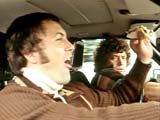
DOYLE: If you go on munching bread and fried grub, you're not gonna make old bones, you know.
BODIE: [gestures with sandwich] It's beautiful. Gets the adrenalin flowing.
DOYLE: Clogging yourself up with cholesterol! [Long, significant pause, while Doyle stares at Bodie thoughtfully] Pull over, I'll take the wheel.
BODIE: What?
DOYLE: I just realised the incredible risk I'm taking.
BODIE: What're you talking--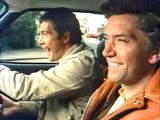 DOYLE: Your jam tart, your heart, could just [snaps fingers] pop at any minute. Go on.
DOYLE: Your jam tart, your heart, could just [snaps fingers] pop at any minute. Go on.
[Doyle wrestles with him for the wheel]
BODIE: Get off! Go on, have the other half! That's what you want, isn't it? I know.
DOYLE: Want it? I wouldn't be seen dead eating that.
BODIE: Just because you forgot to bring your vitamins.
-from "First Night"
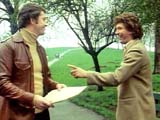 They regularly call into question each other's sanity and disparage each other's intellectual capacity, clothing, eating habits, and/or appeal to the opposite sex - it's all fair game. It's snarky at times, silly at times (as in the "food through a goose" exchange in Lawson's Last Stand, or the "ears like a hawk" exchange in Everest Was Also Conquered), and surprisingly suggestive at times ("I'm like a fine piece of machinery - I need lubrication," Bodie tells Doyle in Heroes) - but it's always intimate: the undertone of affection is ever-present and unmistakable. Their feelings for each other shine through all the banter - you can see it in the way they look at each other, in the obvious pleasure they get from the interaction, in the pet names they use for each other with affectionate mockery ("handsome," "golli," "angelfish"), in the general absence of barbed edges to their insults, in their constant togetherness.
They regularly call into question each other's sanity and disparage each other's intellectual capacity, clothing, eating habits, and/or appeal to the opposite sex - it's all fair game. It's snarky at times, silly at times (as in the "food through a goose" exchange in Lawson's Last Stand, or the "ears like a hawk" exchange in Everest Was Also Conquered), and surprisingly suggestive at times ("I'm like a fine piece of machinery - I need lubrication," Bodie tells Doyle in Heroes) - but it's always intimate: the undertone of affection is ever-present and unmistakable. Their feelings for each other shine through all the banter - you can see it in the way they look at each other, in the obvious pleasure they get from the interaction, in the pet names they use for each other with affectionate mockery ("handsome," "golli," "angelfish"), in the general absence of barbed edges to their insults, in their constant togetherness.
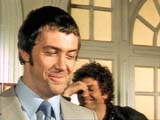 And with very few exceptions, even when they're with other people, their primary focus is always each other. They appear to be engaged in a constant effort to amuse each other, keep each other's attention, entertain and perform for each other. Bodie regularly makes outrageous comments and then looks to see Ray's reaction; inevitably Ray is in the background covering his mouth and snickering, trying not to crack up, while Bodie attempts to keep a straight face and looks quite smugly pleased with himself:
And with very few exceptions, even when they're with other people, their primary focus is always each other. They appear to be engaged in a constant effort to amuse each other, keep each other's attention, entertain and perform for each other. Bodie regularly makes outrageous comments and then looks to see Ray's reaction; inevitably Ray is in the background covering his mouth and snickering, trying not to crack up, while Bodie attempts to keep a straight face and looks quite smugly pleased with himself:
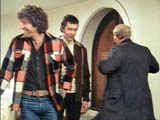
COWLEY: There's something waiting for us in a telephone box.
MINISTER: I don't like the sound of that 'something'.
BODIE: Half an ear, perhaps?!
COWLEY [as Doyle cracks up]: There are times, Bodie, when I find your ribaldry quite distasteful!
- From "First Night"
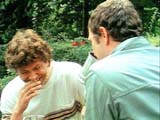
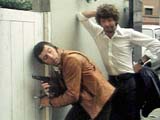 And Ray obliges, laughing at Bodie's jokes, sniggering when he camps it up, as he often does, and indulging his sometimes macabre sense of humor. This dynamic - Bodie acting charmingly boorish and smug and Ray responding with tolerant amusement - is typical of them. A great example is the end of Private Madness, Public Danger: they're treading water in the cold reservoir, Doyle watching as Bodie struggles to defuse a bomb. Bodie pretends that he's failed, that he's detonated the bomb, and Doyle's reaction - a kind of choked, half-laughing, half outraged exclamation: "Bodie, don't do that, you b….," overflows with a combination of affection, admiration (for Bodie's sheer gall), amusement, exasperation, and resigned acceptance (of Bodie's warped sense of humor).
And Ray obliges, laughing at Bodie's jokes, sniggering when he camps it up, as he often does, and indulging his sometimes macabre sense of humor. This dynamic - Bodie acting charmingly boorish and smug and Ray responding with tolerant amusement - is typical of them. A great example is the end of Private Madness, Public Danger: they're treading water in the cold reservoir, Doyle watching as Bodie struggles to defuse a bomb. Bodie pretends that he's failed, that he's detonated the bomb, and Doyle's reaction - a kind of choked, half-laughing, half outraged exclamation: "Bodie, don't do that, you b….," overflows with a combination of affection, admiration (for Bodie's sheer gall), amusement, exasperation, and resigned acceptance (of Bodie's warped sense of humor).
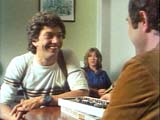 For all his volatility, Ray really is fairly self-contained much of the time, and particularly when it comes to positive emotion. He seldom laughs outright, and though he has a wide, white, kind of dorky-looking (but ridiculously appealing!) grin, he seldom reveals it - except to Bodie. And it's abundantly clear that Bodie revels in the fact that he alone can evoke this reaction from Ray - just as Ray revels in the fact that Bodie expends so much effort to do so.
For all his volatility, Ray really is fairly self-contained much of the time, and particularly when it comes to positive emotion. He seldom laughs outright, and though he has a wide, white, kind of dorky-looking (but ridiculously appealing!) grin, he seldom reveals it - except to Bodie. And it's abundantly clear that Bodie revels in the fact that he alone can evoke this reaction from Ray - just as Ray revels in the fact that Bodie expends so much effort to do so.
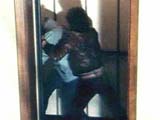 Their affection for, and absolute ease with, each other extends to the physical; indeed, it's perhaps most noteworthy there, since that type of physical contact isn't the norm for tough, macho, British guys, and neither exhibits it toward anyone else. They seem to take advantage of every opportunity to touch each other; they scuffle and rough-house like boys, and neither has any real concept of personal space when it comes to the other - they stand and walk revealingly close together (even taking into account the fact that camera angles require co-stars to stand in more-than-normal proximity), and they constantly pat and touch each other, even while they're working.
Their affection for, and absolute ease with, each other extends to the physical; indeed, it's perhaps most noteworthy there, since that type of physical contact isn't the norm for tough, macho, British guys, and neither exhibits it toward anyone else. They seem to take advantage of every opportunity to touch each other; they scuffle and rough-house like boys, and neither has any real concept of personal space when it comes to the other - they stand and walk revealingly close together (even taking into account the fact that camera angles require co-stars to stand in more-than-normal proximity), and they constantly pat and touch each other, even while they're working.
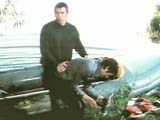 This entirely gratuitous touching goes both ways, but it's particularly characteristic of Bodie - he ruffles Doyle's hair in Hunter/Hunted, puts a proprietary hand on his back when they enter a room in Heroes, even quite blatantly pats his bum as Doyle walks up the stairs ahead of him in Rogue. At the end of Private Madness, Public Danger, Doyle is bending over securing the boat to the mooring; Bodie exits the boat behind him and puts his hands on Doyle's hips to move him aside so he can pass. The pose is very suggestive, with Bodie's groin against Doyle's rear, yet Doyle doesn't blink an eye. This constant touching, this physical familiarity, this comfort in each other's personal space is apparently so normal for them that Doyle doesn't even notice it.
This entirely gratuitous touching goes both ways, but it's particularly characteristic of Bodie - he ruffles Doyle's hair in Hunter/Hunted, puts a proprietary hand on his back when they enter a room in Heroes, even quite blatantly pats his bum as Doyle walks up the stairs ahead of him in Rogue. At the end of Private Madness, Public Danger, Doyle is bending over securing the boat to the mooring; Bodie exits the boat behind him and puts his hands on Doyle's hips to move him aside so he can pass. The pose is very suggestive, with Bodie's groin against Doyle's rear, yet Doyle doesn't blink an eye. This constant touching, this physical familiarity, this comfort in each other's personal space is apparently so normal for them that Doyle doesn't even notice it.
DOYLE: What do you know about Greeks, Bodie?
BODIE: Uh, the fellows all dance together and the cops shave their heads.
DOYLE: They are a tight-knit community.
BODIE: Yeah, ghetto time.
DOYLE: Don't knock it. Ghetto means, um, being able to depend on your own kind.
BODIE: So, you and me are a mobile ghetto, eh?
-From "Killer with a Long Arm"
The bantering, the back-and-forth, the snark and the scuffling and the one-upmanship - all of which, incidentally, looks an awful lot like flirting - this is the face Bodie and Doyle show to the world and to each other, day-to-day. But when push comes to shove, when it really counts, the bullshit stops cold: no more joking, no more playing, no more snark, and they are entirely there for each other and only each other, each clearly trusting the other wholly and implicitly.
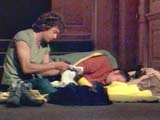 You can see this total trust in the various rare, intense, beautiful, intimate moments in which they exhibit what looks suspiciously like tenderness, serious moments in which each reveals his vulnerabilities, lets down his walls. One of the best examples of this is in Mixed Doubles, the night before the big op, when Bodie and Doyle are camped out at the meeting venue. Their discussion ranges from their childhoods to their belief (or not) in an afterlife, but it's this exchange the next morning, I think, that truly reveals their total trust for each other:
You can see this total trust in the various rare, intense, beautiful, intimate moments in which they exhibit what looks suspiciously like tenderness, serious moments in which each reveals his vulnerabilities, lets down his walls. One of the best examples of this is in Mixed Doubles, the night before the big op, when Bodie and Doyle are camped out at the meeting venue. Their discussion ranges from their childhoods to their belief (or not) in an afterlife, but it's this exchange the next morning, I think, that truly reveals their total trust for each other:
BODIE: You scared?
DOYLE: Yeah. You?
BODIE: Yeah, all the time.
For men like these two, and considering their chosen occupation, this is quite an admission, and it's difficult to imagine that either would make it to anyone but the other.
On the job, each relies on the other literally for his survival and must trust the other totally. At the end of Killer with a Long Arm, Bodie crashes into the bad guy's flat through the balcony, and Ray, acting as his backup, bursts through the door. Ray doesn't shoot immediately, though, and Bodie challenges him later on his apparent lapse:
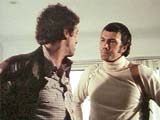 BODIE: Look, a bust-in like that, you're supposed to shoot from the door.
BODIE: Look, a bust-in like that, you're supposed to shoot from the door.
DOYLE: Yeah, and suppose I--
BODIE: Well, the next time, you can be the monkey on the string and I'll be the back up.
DOYLE: And if I had fired from the door and missed, who was standing in the window?
[Pause as they stare at each other.]
BODIE: Since when did you ever miss?
Doyle's first concern is for Bodie; he's not willing to take the risk - but Bodie trusts Ray completely.
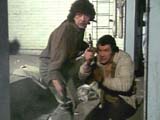 This type of trust requires that they be entirely attuned to each other, able to communicate on unspoken levels. One of my favorites of the many examples of this wordless communication is the scene at the end of Servant With Two Masters, when Bodie, Doyle, and Cowley confront Plumb of the Foreign Office. He pulls out his little gun from behind his desk, and without saying anything, not even looking at each other, Bodie and Doyle act in perfect concert to disarm him: Doyle blinds him with the desk lamp while Bodie snatches his gun away. It's a wonderful example of how in sync they are with each other, how well they know each other, how they almost read each other's minds.
This type of trust requires that they be entirely attuned to each other, able to communicate on unspoken levels. One of my favorites of the many examples of this wordless communication is the scene at the end of Servant With Two Masters, when Bodie, Doyle, and Cowley confront Plumb of the Foreign Office. He pulls out his little gun from behind his desk, and without saying anything, not even looking at each other, Bodie and Doyle act in perfect concert to disarm him: Doyle blinds him with the desk lamp while Bodie snatches his gun away. It's a wonderful example of how in sync they are with each other, how well they know each other, how they almost read each other's minds.
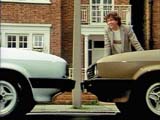 Another amusing example is in Spy Probe, when Bodie and Doyle, in white and gold Capris, respectively, drive at each other at full speed from opposite ends of a short road. Without any obvious communication, they slam on their brakes almost simultaneously; each is able to predict the other's actions and reactions with such precision that the cars come to a halt with their noses a mere four inches apart. Their faith in each other, and knowledge of each other, is complete - each knows he can depend on the other comprehensively and unquestioningly.
Another amusing example is in Spy Probe, when Bodie and Doyle, in white and gold Capris, respectively, drive at each other at full speed from opposite ends of a short road. Without any obvious communication, they slam on their brakes almost simultaneously; each is able to predict the other's actions and reactions with such precision that the cars come to a halt with their noses a mere four inches apart. Their faith in each other, and knowledge of each other, is complete - each knows he can depend on the other comprehensively and unquestioningly.
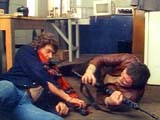 They know they can depend on each other - and, in the end, only on each other. Notably, when Ray says "ghetto" means "being able to depend on your own kind," Bodie doesn't respond that CI5 is a ghetto. "You and me" are the ghetto, he says - he and Ray, and only he and Ray, because when it comes down to it, there is no one else that either can trust entirely. It's not that they don't trust and respect and even care about Cowley and their fellow agents - but when push comes to shove, they come first only to each other. The other agents have their own commitments, and though Cowley's concern for his men seems genuine, his first priority is CI5, the institution; more than once Cowley tells them that if anything goes wrong they can expect no help from him or CI5. In Operation Susie he goes so far as to disclose their secret hiding spot to those who are out to get them when told that failure to do so could jeopardize CI5. Though he doesn't abandon them - he continues to work the official channels to try to save them, and ultimately succeeds at the last moment - it's clear that he will let them fall rather than risk the organization he has worked so hard to create.
They know they can depend on each other - and, in the end, only on each other. Notably, when Ray says "ghetto" means "being able to depend on your own kind," Bodie doesn't respond that CI5 is a ghetto. "You and me" are the ghetto, he says - he and Ray, and only he and Ray, because when it comes down to it, there is no one else that either can trust entirely. It's not that they don't trust and respect and even care about Cowley and their fellow agents - but when push comes to shove, they come first only to each other. The other agents have their own commitments, and though Cowley's concern for his men seems genuine, his first priority is CI5, the institution; more than once Cowley tells them that if anything goes wrong they can expect no help from him or CI5. In Operation Susie he goes so far as to disclose their secret hiding spot to those who are out to get them when told that failure to do so could jeopardize CI5. Though he doesn't abandon them - he continues to work the official channels to try to save them, and ultimately succeeds at the last moment - it's clear that he will let them fall rather than risk the organization he has worked so hard to create.
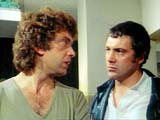 Only to each other are they the first, highest priority. Both are more than willing to defy Cowley, and even apparently to give up their jobs if necessary, to protect each other, save each other, avenge each other. Each seems to trust, deeply and fundamentally, that the other will come through for him even if no one else will, that no matter what the situation appears at first blush, no matter the provocation, his partner - unlike the rest of the world - will never let him down, will always stand by him. In Involvement Ray lashes out at Bodie when he finds out Bodie's been observing him and Ann, checking out Ann's father - but after his initial surge of anger he apologizes, realizing that Bodie hasn't betrayed him, that his welfare has always been Bodie's first concern. Fall Girl ends with Bodie walking away from Ray in anger, presumably because he feels betrayed by Doyle - but it's clear that Doyle has never stopped believing in Bodie, has acted as he has in order to establish Bodie's innocence to the rest of the world.
Only to each other are they the first, highest priority. Both are more than willing to defy Cowley, and even apparently to give up their jobs if necessary, to protect each other, save each other, avenge each other. Each seems to trust, deeply and fundamentally, that the other will come through for him even if no one else will, that no matter what the situation appears at first blush, no matter the provocation, his partner - unlike the rest of the world - will never let him down, will always stand by him. In Involvement Ray lashes out at Bodie when he finds out Bodie's been observing him and Ann, checking out Ann's father - but after his initial surge of anger he apologizes, realizing that Bodie hasn't betrayed him, that his welfare has always been Bodie's first concern. Fall Girl ends with Bodie walking away from Ray in anger, presumably because he feels betrayed by Doyle - but it's clear that Doyle has never stopped believing in Bodie, has acted as he has in order to establish Bodie's innocence to the rest of the world.
One presumes that Bodie will realize this too, once he's had time to calm down. Because Bodie knows, as he says to Doyle in Operation Susie, that ultimately, "It's always us, isn't it" - always, and only, the two of them, for each other and against the world.
DOYLE: That's right, but he won't, will he? Well, not yet anyway. He's teasing me. He's not just a nutter; he's a sadistic nutter. He's setting me up.
BODIE: Yeah, and you're just going to sit here and take it like a traditional nanny goat.
DOYLE: Till he comes out to get me.
BODIE: And then what?
DOYLE: You'll save me.
-From "Hunter/Hunted"
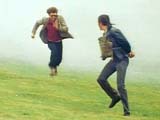
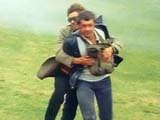 Their fierce protectiveness for each other comes to the fore when either is in danger. One of the most compelling examples of this is at the end of Fugitive, when Bodie has a ticking bomb strapped to his back. He runs desperately from Ray, knowing the bad guy will press the detonator button any moment and wanting to protect Ray and Cowley and the others from the explosion, but Ray won't let him go: he yells "come back" and chases after him, tackles him to the ground and rips the bomb from his back, throwing it into the air just as it explodes.
Their fierce protectiveness for each other comes to the fore when either is in danger. One of the most compelling examples of this is at the end of Fugitive, when Bodie has a ticking bomb strapped to his back. He runs desperately from Ray, knowing the bad guy will press the detonator button any moment and wanting to protect Ray and Cowley and the others from the explosion, but Ray won't let him go: he yells "come back" and chases after him, tackles him to the ground and rips the bomb from his back, throwing it into the air just as it explodes.
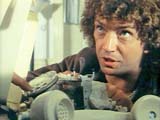 Their actions in situations like this say oh-so-clearly "I'd rather die than endanger you" and "I'd rather die than let anything happen to you." Each is willing to sacrifice his own life to save the other, and neither is willing to leave the other alone to face danger. In The Purging of CI5, someone is killing CI5 agents. After defusing a bomb in Bodie's phone (in a scene that is one of the most understatedly powerful illustrations of their attachment to each other in the entire series), Doyle is worried that a bomb might have been planted in their car. He suggests that Bodie could wait across the street while Doyle starts the ignition - " Not much point in us both getting blown up, is there?" he asks. Bodie's opinion of this suggestion is evident from the speaking look he gives Ray. "Oh, stick it in," he says (referring to the car key, though the comment comes out sounding highly suggestive!), not bothering to give even a moment's consideration to the obviously ludicrous suggestion that he leave Ray alone to face the danger. If they go, they will go together.
Their actions in situations like this say oh-so-clearly "I'd rather die than endanger you" and "I'd rather die than let anything happen to you." Each is willing to sacrifice his own life to save the other, and neither is willing to leave the other alone to face danger. In The Purging of CI5, someone is killing CI5 agents. After defusing a bomb in Bodie's phone (in a scene that is one of the most understatedly powerful illustrations of their attachment to each other in the entire series), Doyle is worried that a bomb might have been planted in their car. He suggests that Bodie could wait across the street while Doyle starts the ignition - " Not much point in us both getting blown up, is there?" he asks. Bodie's opinion of this suggestion is evident from the speaking look he gives Ray. "Oh, stick it in," he says (referring to the car key, though the comment comes out sounding highly suggestive!), not bothering to give even a moment's consideration to the obviously ludicrous suggestion that he leave Ray alone to face the danger. If they go, they will go together.
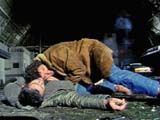 When one is in danger, his safety becomes the other's chief concern. In Hunter/Hunted Bodie threatens Doyle's treacherous girlfriend with a slow and painful death if she fails to reveals Ray's location, and in Mixed Doubles Bodie reacts with shocked outrage, literally shielding Ray with his body, holding him in his arms, when their trainer is beating the stuffing out of Ray during a training session (it's also notable how readily and automatically Ray turns to Bodie for protection). In The Untouchables, when Bodie pretends to have been shot, Doyle rushes to his side yelling "Bodie!" like a lost, tormented soul; he does this also at the end of Close Quarters, bursting into the house where Bodie has been holed up under siege from the bad guys and charging up the stairs two at a time yelling for his partner.
When one is in danger, his safety becomes the other's chief concern. In Hunter/Hunted Bodie threatens Doyle's treacherous girlfriend with a slow and painful death if she fails to reveals Ray's location, and in Mixed Doubles Bodie reacts with shocked outrage, literally shielding Ray with his body, holding him in his arms, when their trainer is beating the stuffing out of Ray during a training session (it's also notable how readily and automatically Ray turns to Bodie for protection). In The Untouchables, when Bodie pretends to have been shot, Doyle rushes to his side yelling "Bodie!" like a lost, tormented soul; he does this also at the end of Close Quarters, bursting into the house where Bodie has been holed up under siege from the bad guys and charging up the stairs two at a time yelling for his partner.
And when either fears for the other, his usual respect for authority evaporates - Doyle threatens to quit if Cowley won't let him work to find the men who knifed Bodie in Klansmen; Bodie throws an operatic, near hysterical fit at Cowley in Slush Fund when the sloppiness of a junior agent has put Ray's life in jeopardy and ignores Cowley's orders in The Ojuka Situation when Ray has been captured by the bad guys:
COWLEY: You disobeyed an order, Bodie. I told you to stay put.
BODIE: Couldn't let them get away with it. How d'you think you'd feel if you let them get him?
COWLEY: My concern for Ojuka has nothing to do with insubordination--
BODIE: I wasn't talking about Ojuka, sir.
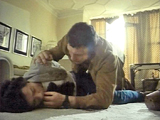
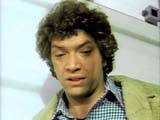 They trade lifesaving maneuvers regularly - in Backtrack Bodie saves Ray when Ray gets a stoppage in his weapon; in The Ojuka Situation Ray saves Bodie when Bodie fails to notice the bad guy creeping up behind him. Each time, though few words are spoken, their feelings - fear, relief, gratitude, trust, affection, love - are manifestly evident from the deep looks they exchange, the way their eyes meet. And when, inevitably, one suffers life-threatening injuries when the other is not present to guard his back, his partner's distress is evident from his reaction: when Bodie is knifed in Klansmen, Ray weeps openly as he walks beside Bodie's hospital gurney - "Oh, Bodie, you half-Irish son of a bitch," he says, tears dripping down his face, "What'd you wanna go and do that for?" And the panicked expression on Bodie's face when he finds Ray shot and bleeding in Discovered in a Graveyard, his furious search for the perpetrator, and his grim, white-faced vigil outside the operating theater, are equally telling.
They trade lifesaving maneuvers regularly - in Backtrack Bodie saves Ray when Ray gets a stoppage in his weapon; in The Ojuka Situation Ray saves Bodie when Bodie fails to notice the bad guy creeping up behind him. Each time, though few words are spoken, their feelings - fear, relief, gratitude, trust, affection, love - are manifestly evident from the deep looks they exchange, the way their eyes meet. And when, inevitably, one suffers life-threatening injuries when the other is not present to guard his back, his partner's distress is evident from his reaction: when Bodie is knifed in Klansmen, Ray weeps openly as he walks beside Bodie's hospital gurney - "Oh, Bodie, you half-Irish son of a bitch," he says, tears dripping down his face, "What'd you wanna go and do that for?" And the panicked expression on Bodie's face when he finds Ray shot and bleeding in Discovered in a Graveyard, his furious search for the perpetrator, and his grim, white-faced vigil outside the operating theater, are equally telling.
Their support for each other when one is in trouble isn't limited to life-threatening situations, either. 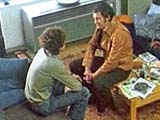 In The Rack, Doyle is wracked with guilt over the death of Paul Coogan, and Bodie attempts to support him, to get him to snap out of his funk and help Cowley prepare for the upcoming hearing. When Doyle rejects his efforts, Bodie tells him fine, I'll handle it myself. "Since when did you ever handle anything on your own?" Doyle demands. "Yeah, well, since when did you?" Bodie retorts, and with that a truce is achieved.
In The Rack, Doyle is wracked with guilt over the death of Paul Coogan, and Bodie attempts to support him, to get him to snap out of his funk and help Cowley prepare for the upcoming hearing. When Doyle rejects his efforts, Bodie tells him fine, I'll handle it myself. "Since when did you ever handle anything on your own?" Doyle demands. "Yeah, well, since when did you?" Bodie retorts, and with that a truce is achieved.
Clearly, neither of them is accustomed to handling anything on his own. Their lives have become too entangled, intertwined, their reliance on each other too complete, their need for each other too great. Every single aspect of their interaction bespeaks teamwork, partnership, intimacy, familiarity, trust, commitment, and devotion. Greater love hath no man than this.
WOMAN [as Bodie leaves his tennis date, after having been called away for a work emergency]: Bodie? Bodie! You've stood me up just once too often!
BODIE: Breaks my heart, really does, honestly, gotta fly.
-From "First Night"
Greater love hath no man … but what about woman? Bodie and Doyle double date, leer at attractive barmaids, sometimes rib each other about women, and occasionally are shown with "girlfriends" - but for most part the "birds" in their lives are fairly irrelevant.
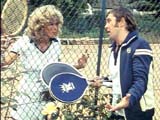 Bodie in particular seems to be all talk and little substance: his almost remorseless disregard for women approaches monumental proportions, particularly when contrasted with the extreme devotion he shows for Ray. "All girls are nice girls," he tells Ray in Old Dog with New Tricks, "as long as they're under fifty, still warm, and come across" - they're useful for getting his leg over, in other words, for satisfying a biological itch, but beyond that he's pretty much indifferent. He doesn't even seem very interested in the ones he's dating, as the opening quote from First Night illustrates most tellingly: when he's called away from the tennis court to investigate the kidnapping of the Israeli ambassador, he doesn't pretend to be even slightly bothered by his girlfriend's angry ultimatum. In The Female Factor, in Ray's flat after a double date, Bodie's attractive date physically tries to wrench his face toward her to kiss him, but he resists, refusing to look away from Ray. And in The Gun, one of the few episodes in which Bodie is shown with a more-or-less "steady" girlfriend, their relationship seems rather more like one of siblings or good pals than of lovers; it's curiously devoid of any sort of passion or intimacy (and the woman sometimes seems somewhat disturbingly maternal in her attitude toward Bodie!).
Bodie in particular seems to be all talk and little substance: his almost remorseless disregard for women approaches monumental proportions, particularly when contrasted with the extreme devotion he shows for Ray. "All girls are nice girls," he tells Ray in Old Dog with New Tricks, "as long as they're under fifty, still warm, and come across" - they're useful for getting his leg over, in other words, for satisfying a biological itch, but beyond that he's pretty much indifferent. He doesn't even seem very interested in the ones he's dating, as the opening quote from First Night illustrates most tellingly: when he's called away from the tennis court to investigate the kidnapping of the Israeli ambassador, he doesn't pretend to be even slightly bothered by his girlfriend's angry ultimatum. In The Female Factor, in Ray's flat after a double date, Bodie's attractive date physically tries to wrench his face toward her to kiss him, but he resists, refusing to look away from Ray. And in The Gun, one of the few episodes in which Bodie is shown with a more-or-less "steady" girlfriend, their relationship seems rather more like one of siblings or good pals than of lovers; it's curiously devoid of any sort of passion or intimacy (and the woman sometimes seems somewhat disturbingly maternal in her attitude toward Bodie!).
And while he occasionally leers at women or makes lewd remarks, his interest in them doesn't survive even the most shallow scrutiny. In Private Madness, Public Danger, the set-up is perfect for Bodie to have a babe-of-the-week love affair with Susan, the pretty heroin addict who's been hospitalized with an overdose. Instead, once he gets the information he needs from her, his sympathetic attitude disappears and he leaves her without a backward glance. In that same episode, he tells Susan he's the "next best thing" to her cat: "not white and fluffy, but plenty of girls think I should be put down" - not the comment of someone who seems to care overmuch about his relationships with women.
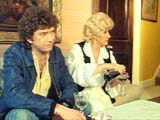 Ray seems the more serious of the two toward women, and unlike Bodie does sometimes show real interest in and passion toward them; he's shown kissing and even occasionally making love with his girlfriends, which Bodie almost never is. In Involvement he hints to Bodie that he might want to marry Ann Holly, and in Takeaway he appears to be living with Esther, the agent from Hong Kong. But other than Esther, the women he chooses invariably turn out to be criminals, or at least utterly wrong for him in one way or another. As for Esther - she's grief-stricken when she has to leave Ray and return to Hong Kong, but he lets her go without a tear of his own (and we know from his reaction to Bodie's knifing in Klansmen that he will cry when sufficiently moved); though he comforts her, there's no sign that he reciprocates her depth of feeling or her sadness at the parting. And he never, ever acts with women the way he acts with Bodie: women don't get that wide white watermelon grin, or the deep, intimate gazes or the extremity of passion and emotion.
Ray seems the more serious of the two toward women, and unlike Bodie does sometimes show real interest in and passion toward them; he's shown kissing and even occasionally making love with his girlfriends, which Bodie almost never is. In Involvement he hints to Bodie that he might want to marry Ann Holly, and in Takeaway he appears to be living with Esther, the agent from Hong Kong. But other than Esther, the women he chooses invariably turn out to be criminals, or at least utterly wrong for him in one way or another. As for Esther - she's grief-stricken when she has to leave Ray and return to Hong Kong, but he lets her go without a tear of his own (and we know from his reaction to Bodie's knifing in Klansmen that he will cry when sufficiently moved); though he comforts her, there's no sign that he reciprocates her depth of feeling or her sadness at the parting. And he never, ever acts with women the way he acts with Bodie: women don't get that wide white watermelon grin, or the deep, intimate gazes or the extremity of passion and emotion.
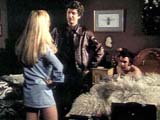
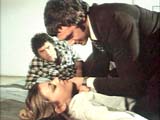 It's also notable that when Bodie does occasionally show some sort of - usually prurient - interest in women, Ray reacts like a jealous lover - he's positively bitchy at times. In Old Dog with New Tricks, when a woman answers Ray's knock on Bodie's door, Ray insults her, calls her (purposely) by the wrong name, and sweeps by her straight to Bodie's bedroom, calling out "good morning, handsome" as he rips the covers off (an apparently naked!) Bodie. Later that day, when Bodie pulls a nurse's torn blouse closed across her chest, Ray says, with a sharp and unmistakable edge in his voice, "Your lucky day, Nurse Bolding. He doesn't often do that."
It's also notable that when Bodie does occasionally show some sort of - usually prurient - interest in women, Ray reacts like a jealous lover - he's positively bitchy at times. In Old Dog with New Tricks, when a woman answers Ray's knock on Bodie's door, Ray insults her, calls her (purposely) by the wrong name, and sweeps by her straight to Bodie's bedroom, calling out "good morning, handsome" as he rips the covers off (an apparently naked!) Bodie. Later that day, when Bodie pulls a nurse's torn blouse closed across her chest, Ray says, with a sharp and unmistakable edge in his voice, "Your lucky day, Nurse Bolding. He doesn't often do that."
None of their relationships with women even approaches the intimacy they have with each other, and indeed, much of the time their interaction with women seems aimed more at each other than at the women anyway - in Long Shot, for example, they "compete" over the new CI5 woman, and when Ray walks away with her at the end of the episode, he looks back gloatingly at Bodie, seeming almost more concerned with Bodie's reaction than he is with the woman. Bodie for his part doesn't seem to care overmuch that he lost the girl, but he good-naturedly salutes Ray for "winning" this round. They care more about playing the game with each other, about what the other thinks, than they do about any particular woman.
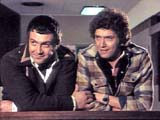
And really, that makes sense. Because in the end, what woman - for that matter, what non-CI5 person - could ever truly understand them or give them what they need? In the end, it's abundantly clear that they are each other's bedrock, that the only relationship that really matters, that's truly indispensable, is their relationship with each other.
MAGGIE: Yes? [sees Doyle] Oh, it's you.
BODIE: Hallo, Maggie.
MAGGIE: [sees Bodie] And you.
DOYLE: Never far apart.
-From "Rogue"
So there it is. And it is all there, wide open, for the taking - but many a show with just as much fodder for slash, on paper at least, has failed to birth a fandom spanning decades. Whence does the enduring appeal of Bodie and Doyle arise?
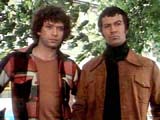
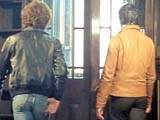 Well, the purely physical aspects should not be minimized: Bodie with his broody pout and remarkable eyes, Doyle with that perfect, perfectly gorgeously sinful mouth, that fallen-angel face, that … arse! These are incredibly sexy guys in really, really, really tight trousers - truly bordering on the obscene at times - incredibly fit and equally dangerous, running and fighting and wielding high-powered weapons with exceptional competence, exhibiting fierce joy in their physical prowess (and total faith in each other's). The pure physicality of the show, and the characters, is a great part of their appeal, and it certainly doesn't require a big stretch of the imagination to picture them in bed together!
Well, the purely physical aspects should not be minimized: Bodie with his broody pout and remarkable eyes, Doyle with that perfect, perfectly gorgeously sinful mouth, that fallen-angel face, that … arse! These are incredibly sexy guys in really, really, really tight trousers - truly bordering on the obscene at times - incredibly fit and equally dangerous, running and fighting and wielding high-powered weapons with exceptional competence, exhibiting fierce joy in their physical prowess (and total faith in each other's). The pure physicality of the show, and the characters, is a great part of their appeal, and it certainly doesn't require a big stretch of the imagination to picture them in bed together!
Beyond the physical appeal is the emotional intensity that characterizes their on-screen relationship. It's easy to quote dialogue; it's far more difficult, impossible in fact, to convey in writing the chemistry between them, the spark. 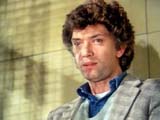
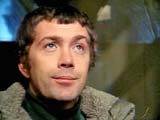 The deep, meaningful looks, the emotional outbursts on each other's behalf, the flashes of intimacy - these give the odd impression of being unscripted, even unintentional, and the emotion they reveal is often surprisingly, almost unnervingly, raw, sometimes leaving you with an uneasily voyeuristic feeling, as if you've inadvertently witnessed, overheard, what was intended to be a supremely private moment. There's no good way to describe this: you simply have to watch, to see the way Ray looks at Bodie after Bodie saves him in Backtrack, or as he's disarming the telephone bomb in Bodie's flat in The Purging of CI5, or when he tells Bodie about what it feels like to lose a partner in When the Heat Cools Off; the way Bodie looks at Ray in The Rack as they sit knee-to-knee, or in Man Without a Past when he finds Ray alive, or in The Ojuka Situation after Ray saves him; you have to hear Bodie's outburst at Cowley in Slush Fund and Ray's outburst in Klansmen, to appreciate the intensity and intimacy of these moments. And once you have, it becomes easier to see why this is a pairing that inspires such enduring devotion, such deep emotional investment, in its fans.
The deep, meaningful looks, the emotional outbursts on each other's behalf, the flashes of intimacy - these give the odd impression of being unscripted, even unintentional, and the emotion they reveal is often surprisingly, almost unnervingly, raw, sometimes leaving you with an uneasily voyeuristic feeling, as if you've inadvertently witnessed, overheard, what was intended to be a supremely private moment. There's no good way to describe this: you simply have to watch, to see the way Ray looks at Bodie after Bodie saves him in Backtrack, or as he's disarming the telephone bomb in Bodie's flat in The Purging of CI5, or when he tells Bodie about what it feels like to lose a partner in When the Heat Cools Off; the way Bodie looks at Ray in The Rack as they sit knee-to-knee, or in Man Without a Past when he finds Ray alive, or in The Ojuka Situation after Ray saves him; you have to hear Bodie's outburst at Cowley in Slush Fund and Ray's outburst in Klansmen, to appreciate the intensity and intimacy of these moments. And once you have, it becomes easier to see why this is a pairing that inspires such enduring devotion, such deep emotional investment, in its fans.
But even beyond all this, beyond the appeal of what's there on the screen, is the appeal of the idea of Bodie and Doyle: the idea of brothers-in-arms, of big, huge, indestructible love between tough fighting men, killers who would kill for each other - and die for each other. One is reminded of the Sacred Band of Thebes (and perhaps Achilles and his Myrmidons): an army of lovers, each a better soldier because he fights at the side of his beloved, who in turn is fighting for him. As here, no bond could be truer; they might never betray affection by more than a grunt and a slap on the shoulder and a quick glance, but if a bullet needs stopping….
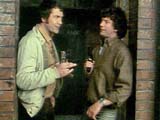 And also, there is the appeal of the idea that Bodie and Doyle are tough, hard, ruthless, violent men, even sometimes with each other (hardly a Pros vid has been made that doesn't feature the scene in Involvement when Ray punches Bodie) - no cream puffs they, as Bodie tells Cowley in A Hiding to Nothing - but when it comes down to it, they need each other on every level - and, in the end, have no one but each other. Bodie and Doyle are entrenched in a job that isolates them from the "regular" world almost more than any other occupation imaginable. They are like cops in some ways - they are "good" guys, fighting on the side of right. But they're more than mere cops - they are the "elite crime fighters," the ones whose job is to protect society from the greatest evil, from the worst, most vicious and vile criminal and terrorist activity, things that even cops don't have to confront.
And also, there is the appeal of the idea that Bodie and Doyle are tough, hard, ruthless, violent men, even sometimes with each other (hardly a Pros vid has been made that doesn't feature the scene in Involvement when Ray punches Bodie) - no cream puffs they, as Bodie tells Cowley in A Hiding to Nothing - but when it comes down to it, they need each other on every level - and, in the end, have no one but each other. Bodie and Doyle are entrenched in a job that isolates them from the "regular" world almost more than any other occupation imaginable. They are like cops in some ways - they are "good" guys, fighting on the side of right. But they're more than mere cops - they are the "elite crime fighters," the ones whose job is to protect society from the greatest evil, from the worst, most vicious and vile criminal and terrorist activity, things that even cops don't have to confront.
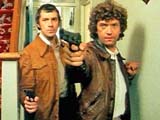 It seems almost inevitable that in order to do this they must become a little evil themselves, or at least come really, really, really close to evil; what they must do to protect society may at times seem indistinguishable from what the "bad guys" do to destroy it - they must be killers in order to be protectors. In Close Quarters the bad guy taunts Bodie, saying "we aren't so very different, are we?" and Bodie's girlfriend agrees. "You live by violence, just like him!" she accuses. "I'm doing this to protect you - people like you!" Bodie replies, "you have to fight fire with fire in this job" - but the question remains: if you have to be able and willing to kill in order to protect, how do you stop yourself from becoming a killer? In Heroes, Bodie calls fellow agent Crazy Tommy McKay a killer, and Ray asks what makes him (Bodie) so different. Bodie says he's different because he doesn't enjoy the killing - but that's always the risk, isn't it, that the good guys will slip over the line from having to do it to wanting to do it; that they will become, or become indistinguishable from, the very thing they're fighting. And even if they don't, even if their intent remains good - given the methods that they use, are they still in the end no better than the bad guys?
It seems almost inevitable that in order to do this they must become a little evil themselves, or at least come really, really, really close to evil; what they must do to protect society may at times seem indistinguishable from what the "bad guys" do to destroy it - they must be killers in order to be protectors. In Close Quarters the bad guy taunts Bodie, saying "we aren't so very different, are we?" and Bodie's girlfriend agrees. "You live by violence, just like him!" she accuses. "I'm doing this to protect you - people like you!" Bodie replies, "you have to fight fire with fire in this job" - but the question remains: if you have to be able and willing to kill in order to protect, how do you stop yourself from becoming a killer? In Heroes, Bodie calls fellow agent Crazy Tommy McKay a killer, and Ray asks what makes him (Bodie) so different. Bodie says he's different because he doesn't enjoy the killing - but that's always the risk, isn't it, that the good guys will slip over the line from having to do it to wanting to do it; that they will become, or become indistinguishable from, the very thing they're fighting. And even if they don't, even if their intent remains good - given the methods that they use, are they still in the end no better than the bad guys?
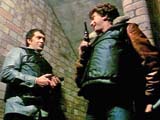 When you take on the baddest of the baddies, as Bodie and Doyle do, those questions are always lurking, because becoming hardened, skirting the line between good and bad, is unavoidable. Paradoxically, the result is to isolate them from the very people they're protecting. CI5's mandate is to combat "anarchy, terrorism, crimes against the public," so that the "public" can go about their business unaware of the evil that threatens them, believing they are secure - but the agents couldn't accomplish this if they themselves were one of the "public." They confront evil, fight it, so that those they are protecting do not have to, and that inevitably sets them apart almost insurmountably from the rest of the world.
When you take on the baddest of the baddies, as Bodie and Doyle do, those questions are always lurking, because becoming hardened, skirting the line between good and bad, is unavoidable. Paradoxically, the result is to isolate them from the very people they're protecting. CI5's mandate is to combat "anarchy, terrorism, crimes against the public," so that the "public" can go about their business unaware of the evil that threatens them, believing they are secure - but the agents couldn't accomplish this if they themselves were one of the "public." They confront evil, fight it, so that those they are protecting do not have to, and that inevitably sets them apart almost insurmountably from the rest of the world.
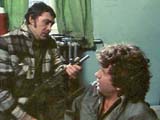 This, then, is why it's so easy to believe that there's no way Bodie and Doyle could ever have a real connection with one of their "birds." The women they date are part of the "rest of the world" - they have normal everyday concerns, they're annoyed by Bodie and Doyle's unpredictable schedules and frequent absences, they don't understand why Bodie and Doyle have to do the things they do (in Involvement, Ann Holly ultimately leaves Doyle because she can't accept the violence of his life - and perhaps the violence that is part of his character) - to the extent they even know what Bodie and Doyle do, that is, since presumably most of it is classified. Bodie and Doyle simply live in a different world, a grittier, uglier, more dangerous world where they have to be prepared to kill - or be killed - at any moment, and where, by necessity, they perhaps are not entirely sane, where insanity becomes normality: as Bodie says in Everest Is Also Conquered, "you have to be mad in this job or you'd go insane."
This, then, is why it's so easy to believe that there's no way Bodie and Doyle could ever have a real connection with one of their "birds." The women they date are part of the "rest of the world" - they have normal everyday concerns, they're annoyed by Bodie and Doyle's unpredictable schedules and frequent absences, they don't understand why Bodie and Doyle have to do the things they do (in Involvement, Ann Holly ultimately leaves Doyle because she can't accept the violence of his life - and perhaps the violence that is part of his character) - to the extent they even know what Bodie and Doyle do, that is, since presumably most of it is classified. Bodie and Doyle simply live in a different world, a grittier, uglier, more dangerous world where they have to be prepared to kill - or be killed - at any moment, and where, by necessity, they perhaps are not entirely sane, where insanity becomes normality: as Bodie says in Everest Is Also Conquered, "you have to be mad in this job or you'd go insane."
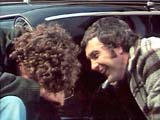 Who, then, can they turn to, given that this is the nature of their lives? The answer is obvious - each other, and no one but each other, because who else but their partner could understand the danger, the isolation, the temptation and the risk; could help them stay on the right side of that line between good guy and bad guy, help them hang on to their humanity? Who else could understand and accept the killer that is, that has to be, part of them? Who else knows what it's like to face death as a matter of course, to confront regularly the unspeakable horrors that humans are capable of inflicting upon each other? Who else could laugh about it with them, laugh in the teeth of the greatest risk and danger? One is tempted to imagine that Crazy Tommy McKay got that way because he didn't have a partner to help keep him on the right side of that line.
Who, then, can they turn to, given that this is the nature of their lives? The answer is obvious - each other, and no one but each other, because who else but their partner could understand the danger, the isolation, the temptation and the risk; could help them stay on the right side of that line between good guy and bad guy, help them hang on to their humanity? Who else could understand and accept the killer that is, that has to be, part of them? Who else knows what it's like to face death as a matter of course, to confront regularly the unspeakable horrors that humans are capable of inflicting upon each other? Who else could laugh about it with them, laugh in the teeth of the greatest risk and danger? One is tempted to imagine that Crazy Tommy McKay got that way because he didn't have a partner to help keep him on the right side of that line.
There is simply enormous appeal to the idea of two tough, hardened guys coming together in the context of their dangerous, gritty, soul-threatening, violent job, a job that virtually requires them to rely on each other, turn to each other, need each other for everything - for sanity, for companionship, for a moral compass, and of course for life itself.
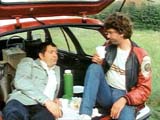 And of course, there is great appeal to the idea of two such hard, emotionally-well-defended and independent men, in such a "macho" occupation, open to blackmail, at risk of losing one another every single day as an occupational hazard, finding love together. It's difficult to resist the idea that the bantering, the fun, the black humor, and the occasional almost shy tenderness they share with each other - and with no one else - are the few rays of light in their uniquely bleak world; that their relationship with each other is what saves their lives from being dark and empty - that without each other they'd have no one, they'd be truly alone.
And of course, there is great appeal to the idea of two such hard, emotionally-well-defended and independent men, in such a "macho" occupation, open to blackmail, at risk of losing one another every single day as an occupational hazard, finding love together. It's difficult to resist the idea that the bantering, the fun, the black humor, and the occasional almost shy tenderness they share with each other - and with no one else - are the few rays of light in their uniquely bleak world; that their relationship with each other is what saves their lives from being dark and empty - that without each other they'd have no one, they'd be truly alone.
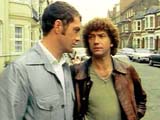 In No Stone, the pregnant wife of a young CI5 agent who has just been killed sobs furiously at Doyle, "it's OK for you, you don't have anyone." And one can't help but feel that if they didn't have each other she might be right, that without each other their lives would be devoid of love and caring and connection, they'd be alone. But they do have each other - for hope, for salvation, for comfort in the face of a thankless job with few rewards and little ultimate chance of success, for understanding, for acceptance of even their darker sides - for love.
In No Stone, the pregnant wife of a young CI5 agent who has just been killed sobs furiously at Doyle, "it's OK for you, you don't have anyone." And one can't help but feel that if they didn't have each other she might be right, that without each other their lives would be devoid of love and caring and connection, they'd be alone. But they do have each other - for hope, for salvation, for comfort in the face of a thankless job with few rewards and little ultimate chance of success, for understanding, for acceptance of even their darker sides - for love.
They have each other, and we have them - the beauty and power and understated intensity of their bond, the obvious depth of their devotion to each other, the humor and affection and tenderness they show toward each other, so unexpected between two such hardened, tough-as-nails men, and all the more moving for that. To those - like me - who are drawn to this sort of thing, their appeal is timeless, utterly irresistible, and unrivaled by any other fandom or pairing.
Which, in a nutshell, is why Bodie and Doyle have captured - no, stolen - the hearts and imaginations of countless slashergirls for two decades and counting.
Resources
All 57 Pros episodes have been released on DVD. The DVDs, which are available from Amazon UK and other British sources, have Region 2 protections and are in PAL format; non-UK fans must have proper equipment to play them.
Not surprisingly for such an old fandom, Pros has a vast body of fanfic, a significant percentage of which was published originally in zines. However, the amount of fiction available online is substantial and ever increasing.
The Circuit Archive is the largest online repository of Pros fanfic, with over 1200 stories, including a large number that were originally published in zines, as well as an increasing amount of Pros fan art. The Resources section of the site contains links to a number of essential Pros resources, and the About the Archive section gives a brief history of the fandom. Updates to the Circuit Archive are announced on the circuit_archive livejournal and the circuit_archive Yahoo group mailing list.
The Hatstand has an archive of Pros fic, as well as some excellent resources for Pros fans, including transcripts of all 57 episodes and the two Bullshitters spoofs, exhaustive lists of Pros stories broken down into various categories by subject matter or type of story, and a list of Pros songvids and links to vidders' websites. Updates to the Hatstand are announced on the hatstander livejournal and the hatstand Yahoo group mailing list.
The Pros Library CD contains hundreds of stories, including some that are not available online. It is available through the owner of the Proslib Yahoo group mailing list, which is not a discussion list, but rather is solely a forum for the list owner to make Pros-related announcements, particularly regarding additions to the Proslib CD (which are posted to the list). The Files and Links sections of the group site contain all sorts of essential Pros-related information and resources.
Many stories remain available only in zines. The Files and Links sections of the Proslib mailing list site includes information about zine publishers and lists of all Pros zines (and multifandom zines with Pros content) and their contents.
Pros-lit is the main Pros slash discussion list, and the_safehouse is the Pros livejournal community.